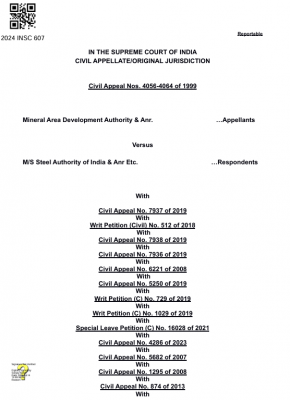Supreme Court Judgment on Retrospective Application of Mining Taxation Ruling: Balancing Legal Precedent and Practical Implications
Supreme Court judgment dated August 14, 2024, involving a significant legal issue related to the retrospective application of a court ruling in mining taxation.
Summary of the Judgment:
1. Background :
– The case involves the overruling of the 1990 India Cement Ltd. v. State of Tamil Nadu decision by the nine-Judge Bench of the Supreme Court in the Mineral Area Development Authority (MADA) case. The overruling decision raised questions about whether the new ruling should have retrospective or prospective effect.
2. Submissions :
– Various senior legal counsels argued both for and against the retrospective application of the MADA ruling. The primary concern for those against retrospective application was that it would lead to significant financial burdens on parties who had relied on the earlier law, potentially disrupting past transactions and commercial agreements.
– On the other hand, proponents of retrospective application argued that the law must be uniformly applied from the date it was established, and that prospective application would create legal inconsistencies.
3. Prospective Overruling :
– The court discussed the doctrine of prospective overruling, which is applied when a new judicial decision overrules established precedents. The court traced the origin of this doctrine to both U.S. and Indian jurisprudence, particularly the landmark Golak Nath case, and outlined its principles. The doctrine allows a court to limit the application of its ruling to future cases to prevent injustice or chaos.
4. Conclusion :
– The court considered both the legal principles and the practical implications of applying the MADA ruling retrospectively or prospectively. The judgment likely included directives on how the ruling should be implemented to balance the need for legal consistency with the need to avoid undue hardship for those affected by the change in the law.
This summary captures the key aspects and legal arguments of the judgment, focusing on the debate over the retrospective application of the new legal principles established in the MADA case.
 CA Shafaly Girdharwal
CA Shafaly Girdharwal
CA
New Delhi, India
CA Shaifaly Girdharwal is a GST consultant, Author, Trainer and a famous You tuber. She has taken many seminars on various topics of GST. She is Partner at Ashu Dalmia & Associates and heading the Indirect Tax department. She has authored a book on GST published by Taxmann.








